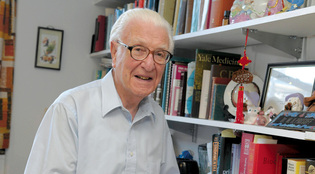 loading
loading
MilestonesInventor of anti-HIV drug dies Michael MarslandWilliam H. Prusoff and a colleague developed a key component of the first multidrug "cocktail" used to treat AIDS. View full image
Pharmacologist William H. Prusoff saved the lives of millions through his development of a key component in the first drug cocktail to treat AIDS. But Prusoff, who died on April 3 at the age of 90, is remembered on campus as much for his modesty and generosity as for his scientific contributions. “He could have built a lavish estate with all the money he earned from his patents,” says Yale virologist and cancer researcher Daniel DiMaio. “But he chose to stay in the modest house in North Branford that he bought in the 1950s.” The son of Russian immigrants who ran a small grocery store in Brooklyn, Prusoff got a doctorate in chemistry from Columbia in 1949 and joined the pharmacology department at Yale in 1953. Prusoff did research in the 1950s that led to the first clinically used antiviral drug. But it is his contribution to the fight against AIDS for which he is best known. In the mid-1980s, Prusoff and his Yale colleague Tai-shun Lin showed that d4T, a failed cancer compound, was effective against HIV. Yale secured a patent for d4T and licensed it to Bristol-Myers Squibb. Marketed under the name Zerit, it became part of the first combination drug therapy for HIV, earning Yale tens of millions of dollars annually and making Prusoff a wealthy man. Prusoff used his earnings to create the William H. Prusoff Foundation, which has supported numerous medical institutions and antipoverty programs. He also became an ardent supporter of the successful campaign to get Bristol-Myers Squibb to lower the drug’s price in sub-Saharan Africa, where AIDS was epidemic. “He just couldn’t imagine choosing money over saving or prolonging the lives of these people,” says his son, Alvin Prusoff.
The comment period has expired.
|
|